Harsh Continent
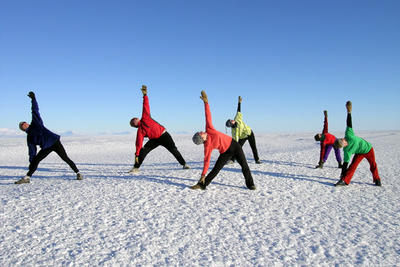
McMurdo yoga class two weeks ago ~ Photographer unknown.
There's a saying here that comes up quite a bit. Slip on the ice and slide 40 feet, then you hear it. A gust of wind tears your hat off your head and blows it over a roof - you hear it again. The ice cream maker in the galley goes berserk and dumps five gallons of ice cream on the floor. Always you hear the same sarcastic comment: "It's a harsh continent". It almost always gets a laugh. Maybe you'd have to be here to understand just how funny it is that people say it all the time, for every little thing. Every once in a while though, that same comment is made quietly, respectfully. The other day someone said it very quietly, and I'd like to start off my last update from Antarctica telling you why.
ANTARCTIC EXPLORERS OF THE WEEK:
This week I'd like to bring to your attention two antarctic explorers who together deserve recognition. They died last week, not here at McMurdo, but here in Antarctica, and they did so while seeking beauty and knowledge in a place that takes as easily as it gives. They were researcher Augusto Thibaud of the Argentine Antarctic Institute and Teofilo Gonzalez, a navy officer and electrician. The two drove their snowmobiles through the roof of a hidden crevasse 180 feet deep on the Antarctic Peninsula. Three others swerved out of the way, and were later rescued by helicopter.
All of us in the U.S. Antarctic Program want to send our heart-felt condolences to their friends and families.
We are reminded again that Antarctica has a cold heart. We are also reminded that people often risk everything to go where their hearts lead them. Many have been lead here, to the bottom of the world, and have proven that every human heart can be noble. Thibaud and Gonzalez proved it by living the lives of true explorers, and listening to their hearts.
Crevasse and 3 survivors:
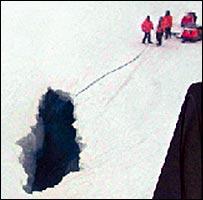
Day 241:
It's time to say goodbye, not to you, but to Antarctica. Tomorrow is what we call "Bag Drag". At 10:00 o'clock I'll be weighed along with my luggage. All luggage, except for one carry-on bag, will be strapped to pallets while Tyler and I suffer room inspection. The next day, twenty fragile winter-overs will board an Air Force C-17 with mixed emotions, worn-out bodies, and happy hearts.
Tonight I'm going to scale Ob Hill one last time, look out over McMurdo Sound, and say goodbye. The sun sets around midnight now, so I'll sit up there in the dim red light of the midnight sun and try to commit every tiny detail to memory. I don't know that I'll ever return to this place, and I confess I'm finding it hard to leave. It's a harsh continent, isn't that what they say? But the ice gets into your veins, and despite the harsh winter I can honestly tell you - I'll be leaving Antarctica younger than when I arrived. Everything else runs backwards here. Why should that be any different? :)
I truly hope these letters have captured one thing if nothing else. . . my awe. Children stand in awe when they first lock eyes with the sea. It's so damn big and so damn blue and so damn full of who-knows-what. As adults we can forget that sometimes, as if the sea were just a big puddle, mountains just big hills, the stars big fires, Antarctica - a big block of ice.
Can I hold onto it after I leave here? I think so. Over 5000 photographs are leaving with me, each one a reminder to stop taking my life for granted:
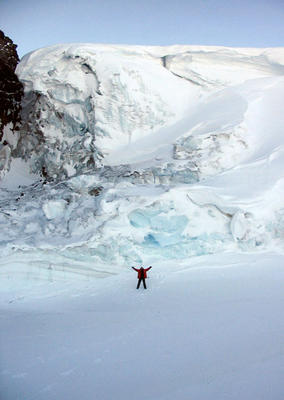
The Many Huts Of Antarctica:
I've written about Scott's Hut before. I glance at it all the time as I go about my antarctic business. That hut was built for the Discovery Expedition in 1902. Nine years later Scott returned to Ross Island with a second expedition. He built another hut at Cape Evans and set out to reach the South Pole. His party made it, but died on the way back. The frozen hut left at Cape Evans is only 15 miles up the coast, but it might as well be 1500 unless you have a justifiable reason to go there.
Last Sunday I found a justifiable reason. Scientists study certain fish here to determine why their blood doesn't freeze. To study a fish, you first have to catch a fish, and I was fortunate enough to tag along with a scientist named Dave in his pursuit of these goofy fishes. There are fish huts scattered across the ice, and we visited three of them, fishing with a line tied to a block of wood through a hole in the ice. The water was crystal clear, with starfish scattered on the bottom and the smell of the sea in my nose. It was a great time, and we came back to the lab with over ten fish. All survived the trip because we kept stopping and giving them more oxygen:)

We also brought up traps left on the ocean floor a few days earlier. Most held a few starfish and lots of huge nasty worms. I didn't try to save the huge nasty worms before they froze solid, but I did save the starfish:
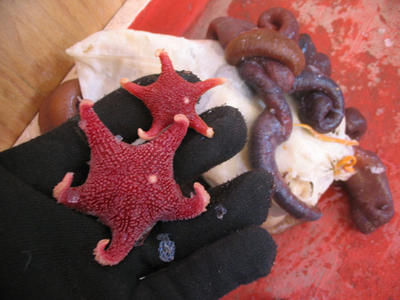
We headed out to Cape Evans in a "Matt-Trak", a truck with 4 little treads instead of tires. We drove over the Ross Ice Shelf along the coast of Ross Island, and for the first time I saw it from a distance - a jagged white coastline barricaded by pressure ridges until it disappeared into the side of the Erebus Ice Tongue. I saw the backsides of familiar landmarks, mirages on the ice, and the impressive Barnes Glacier, its edge a sheer wall of ice rising over 100 feet in the distance. Mt. Erebus was beautiful. As we drew closer to the volcano I could make out details I'd never seen before. Then we passed Inaccessible Island, which I remembered from an atlas back home. I remember reading the name on the map and thinking to myself "why would they call it that"?
Now I know:)
An hour and a half later we pulled up to the fish hut at Cape Evans. I got out, stretched my legs, and took a little walk over some wild cracks in the ice. I stepped on one which caved in beneath me up to my hip. Just one leg, but it gave me a good scare and a sore leg. I took a picture of the hole, but had to erase it later to make room for more pictures. Those cracks lead me to Scott's 2nd hut:

ABOVE: Scott's Hut at Cape Evans.
BELOW: Supplies left outside the hut since 1911:

This hut is far more complex than the Discovery Hut at McMurdo. We couldn't go inside (to my severe disappointment) because we didn't have the key with us. I hear there is a penguin in mid-autopsy on a table in there. There are also dogs still chained outside where they died. I couldn't see them because of the snow, but I know they're out there. Three men died in a blizzard at Cape Evans during Shackleton's later expedition, and no-one returned to tend to the dogs. At least, that's the way it was told to me. I'll have to read up on it. There's a wooden cross nearby erected to the memory of Shackleton's men.
There are five historic huts "near" us that I know of. Each one has its stories of triumph and struggle. It bothers me a bit to be so close to such things, only to turn around and leave them here, unvisited, unphotographed, unexplored.
But I've used up enough of your tax dollars. It's time for someone else to sleep in my bunk. It's not a very good bunk. The springs jam in your back, and there isn't enough head room. But hey. . . it's a harsh continent:)
_____________________________________________
That was it, my last entry from Ross Island. The next update will be typed on the plane as we head north over McMurdo Sound. There were so many things I wanted to write about. I have pictures of the old Nuclear power plant, our one-of-a-kind bowling alley, helium balloons that look like transparent jellyfish, close-ups from the rim of the volcano, bright flares of light reflecting off satellites, strange animals pulled from the sea, and crystalline landscapes that took my breath away.
P.S. - It's the next day. Last night I couldn't scale Ob Hill. A storm blew in fast and sent the runway to Condition One. It also knocked me down because I was being stubborn and didn't want to go inside. So I'm about to make another go of it. Observation Hill was my first challenge here. I climbed it my second day on the Ice, and was rewarded with a good case of pneumonia. I was a stranger here then, and my body was not ready for such things. I am not a stranger here now. This is my home. But a home without a family is no home at all. Soon I will be with the ones I love.
This is Mike Bair, signing off from McMurdo Station, Ross Island,
Antarctica. . .

UNITED STATES ANTARCTIC PROGRAM
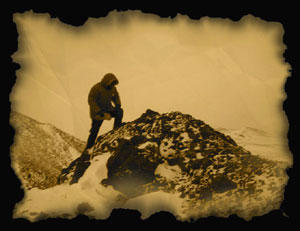

3 Comments:
Andrea, I've got some pictures of other fish that live down there. I'll put some in my next entry. They're just as "insano" as you imagine.
Mike, my plane took off on schedule (though later flights were delayed). I spent a glorious week in New Zealand, and just got home last night after 35 hours of air travel.
Ob Hill couldn't happen because of the weather:(
Will write soon,
Mike
i am completely blown away by what you have done in your life... i sit here in my room, in my brand new house pouting because things are "tough" well you, sir, have shown me that i have nothing to complain about... you guys are awesome!
p.s. those worms were way nasty
i'm in awe of your adventure....too caught up in your gorgeous pictuires to think of anything witty or intelligent to say, aside from
"wow".
Post a Comment
<< Home